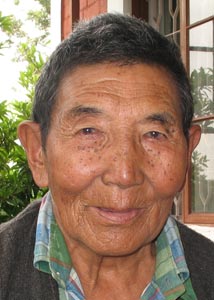Name: Chonphel
(Alias: No)
Gender: Male
Interview Age: 82
Date of Birth: 1925
Birthplace: Shondang, Utsang, Tibet
Year Left Tibet: 1967
Profession: Farming, Nomad
Monk/Nun: No
Political Prisoner: Yes

Interview No.: 85
Date: 2007-06-27
Language: Tibetan
Location: Lugsung Samdupling Settlement, Bylakuppe, Karnataka, India
Categories: Oppression and Imprisonment
Keywords: Chinese -- oppression under, escape experiences, forced labor, imprisonment, refugee in India -- life as, taxes, tenant farmers, thamzing/struggle sessions, Utsang
Summary:
Born in Gyangtse to a family of telpa 'tax payers,' Chonphel's father was a genpo 'village leader.' His family was shung-wok, meaning they were tenants on government-owned land. Chonphel explains the various categories of tenants in Tibet depending on who owned the land: the monasteries, the government or private property owners. He also describes the ma-tel 'butter tax,' sha-tel 'meat tax' and wool tax, and how the taxes were paid to the correct authorities.
Chonphel was the first person from his village to be arrested by the Chinese under false accusations. Relating his miserable prison days, he describes the difficult labor of plowing fields and constructing buildings, while given very little food. Prisoners resorted to eating rats from the fields and leather. He suffered in this way for seven years.
After releasing Chonphel from prison, the Chinese sent him back to his village, where he was subjected to thamzing 'struggle sessions' because he had been a genpo. He worked as a laborer and married again because his first wife remarried while he was in prison. A year later he and his second wife fled to India.
Interview Team:
- Marcella Adamski (Interviewer)
- Tenzin Yangchen (Interpreter)
- Jeff Lodas (Videographer)

